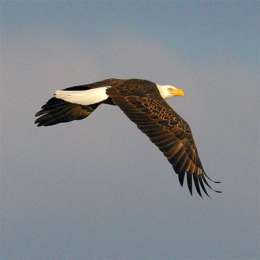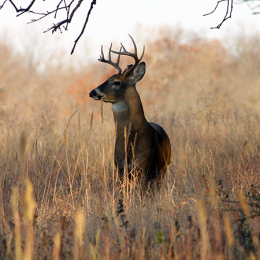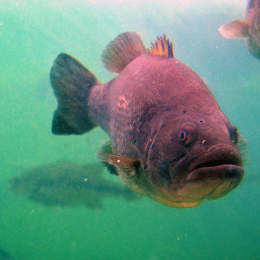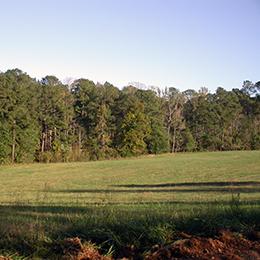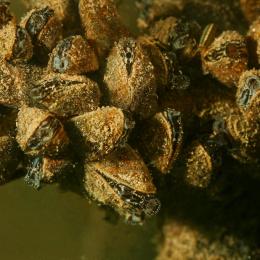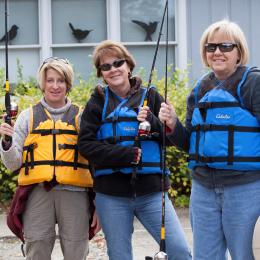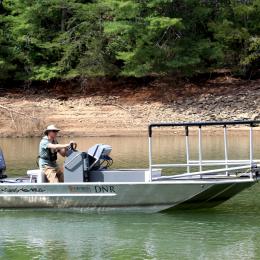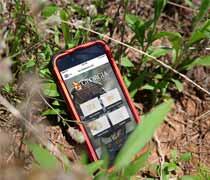Report Bird Mortality
Avian influenza is a viral disease that can infect wild and domestic birds, as well as other animals.
Often called bird flu, the disease can be classified into two categories. Low pathogenic avian influenza (LPAI) causes no or minimal signs of disease and is commonly found in wild ducks and geese and in domestic poultry. Highly pathogenic avian influenza (HPAI) is extremely infectious, not treatable and can cause high death rates in infected species.
Confirmed HPAI cases involving wild birds surged in Georgia and across much of the U.S. in 2022, but by mid-winter 2023 cases in Georgia had returned to normal levels. The disease has particularly affected waterfowl (ducks and geese) and scavenging species such as vultures and bald eagles.
The Centers for Disease Control and Prevention rates the current public health risk as low, but – considering outbreaks in poultry and U.S. dairy, as well as some human cases – is working with states to monitor people with animal exposures.
What DNR Is Doing
The circulation of avian influenza viruses in wild birds is normal. This is why routine annual surveillance and sampling of wild birds have been done for many years. DNR coordinates with other state and federal agencies to monitor, investigate and document cases of HPAI.
- Frequently Asked Questions
Answers to some frequently asked questions about highly pathogenic avian influenza (HPAI).
Ways to Help Prevent HPAI Spread
- Avoid handling sick or dead birds (more on CDC recommendations).
- Seeing multiple dead wild birds in a single place? If they are vultures, crows, waterfowl (ducks and geese), other waterbirds (such as cormorants, pelicans, herons and egrets) or shorebirds (ex., gulls, terns, sandpipers, plovers), please report them to DNR. Also report individual dead or sick birds of prey (eagles, hawks, falcons, owls and osprey). DNR strongly recommends observing such incidents only from a distance to reduce the risk of disease transmission. Call 1-800-366-2661 or a local DNR office for further guidance.
- Keep pets away from sick or dead birds (note: transmission to pets is rare).
The Georgia Department of Agriculture (agr.georgia.gov) provides guidance regarding commercial poultry operations and backyard flocks. Issues involving poultry should be promptly reported to the Georgia Avian Influenza Hotline, (770) 766-6850 or gapoultrylab.org/avian-influenza-hotline.
For concerns about a potential human infection or exposure, please contact your public health department.
- For Hunters
- Wear rubber gloves while handling dead game.
- Wash hands with soap and water or alcohol wipes immediately after handling game.
- Wash tools and work surfaces used to clean game birds with soap and water, then disinfect with a 10% bleach solution.
- Separate raw meat and anything it touches from cooked or ready-to-eat foods to avoid contamination.
- Cook game birds and poultry thoroughly. Meat should reach an internal temperature of 165 degrees Fahrenheit to kill disease organisms and parasites.
- Do not eat, drink or smoke while handling game.
- Dog owners should prevent their dog from having contact with obviously sick game birds or birds found dead in the field. Do not feed dogs raw meat from game birds. Monitor your dog's health and consult your veterinarian for more information about influenza in dogs and other pets. (Canine influenza virus is different from avian influenza viruses. Per disease experts, the risk of infection in dogs is very low at this time.)
For more guidelines concerning the handling of wild birds, please see the USDA guidance for hunters. For more on avian influenza and pets or other animals, see the CDC website.
- For General Public
- Do not handle wild birds that are obviously sick or found dead.
- Bird feeders and bird baths should be cleaned and disinfected regularly. With avian influenza present in wild birds in Georgia, avoid placing bird baths and feeders in proximity to domestic poultry.
- Always wear protective gloves while cleaning feeders, feeding areas and bird baths. Wash carefully afterward.
- Prevent contact of domestic or captive birds with wild birds (especially waterfowl).
For more on avian influenza and pets or other animals, see this CDC guidance.
Reporting Dead Birds
Please report multiple dead vultures, crows, waterfowl (ducks and geese), waterbirds (such as cormorants, pelicans, herons and egrets) and shorebirds (ex., gulls, terns, sandpipers, plovers) seen at a single site. Also report individual dead or sick birds of prey (eagles, hawks, falcons, owls and osprey).
Observe such incidents only from a distance to reduce the risk of transmitting disease.
If you find multiple dead songbirds or other species not specified above, please do not report them using the link. Instead, call 1-800-366-2661 or a local DNR office. The agency can provide further guidance at these contacts.







